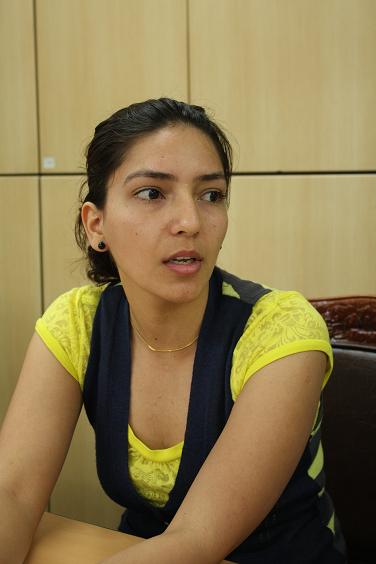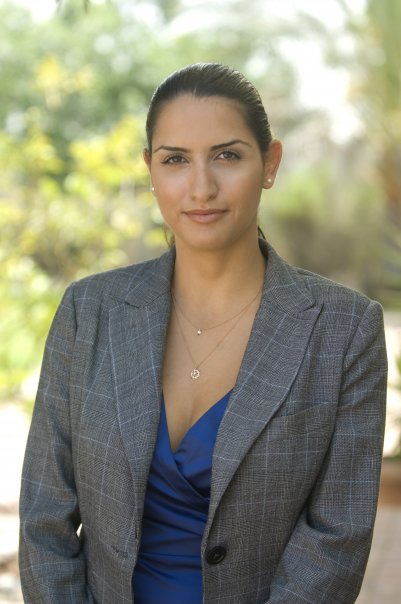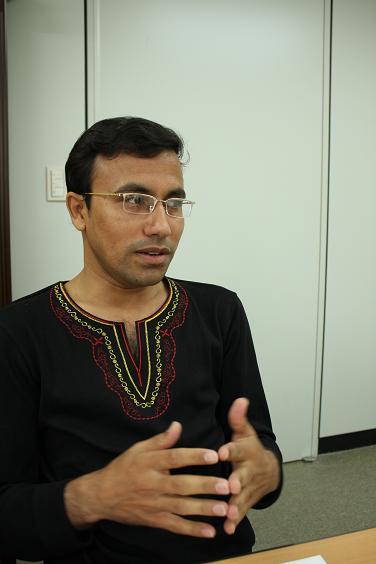Wars around the world
IN SOME corners of the world, there is still war going on. Peace remains beyond reach. It has been nearly 60 years since the Korean War stopped. Yet on April 5th of this year, North Korea launched a rocket, and no South Koreans beseemed to fear, but instead reacted with indifference. Are we really doing something to reach peace?
Box 1: Questions
(1) Could you tell me your country’s experience of conflicts?
(2) What do you think about Korea and its current relationship with North Korea?
(3) What are your thoughts on war and peace in general?
 | ||
Yadav Kadambari(India): (1) India has been a ground for conflicts. The most widely impacting conflict is the religious conflict between the Hindus and the Muslims. The seeds of this conflict were sown when the British colonial governments pursued a policy of “divide and rule.” Since the independence and the partition of India, these religious differences have given rise to religious conflicts, leading in turn to terrorist attacks and communal violence in some of the major states and the cities of India. These religious conflicts are taking much more aggressive forms today and are disrupting the normal lives of Indian citizens. (2) Personally I do not see North Korea as a potential threat to South Korea. I feel at present it is not a full-blown war that one can expect on the Korean peninsula; but one cannot at the same time ignore the possibility of minor attacks or insurgency. I believe the stability of the Korean peninsula is dependent on North Korea’s own achievement of political and economic stability and the means of doing so cannot be foreign aid. (3) I believe reasons behind conflicts that ultimately result in wars are very diverse. Human beings have fought wars since time immemorial and the primary reason behind this is their selfish nature. Therefore, the concept of peace is very idealistic, we can merely construct the possibility of averting conflicts or wars.
 | ||
Mykola Protopopov(Ukraine): (1) It is not well-known that Ukraine was originally called Russia before the civil war started. After the civil war, the October Revolution occurred. It was a rebellion against the Czar, the emperor of Russia. During the war, the country was divided into four factions; the Red, the White, those who wanted to build the independent Ukraine, and those who dreamed of anarchy. (2) In both South and North Korea, there are the Confucian traditions, very natural for Korean people. But, now the distance between the two countries is very great and people hesitate to consider the difficulties that a possible unification would bring. (3) As time goes by, humankind is not learning things from the bitter experience of the past: the number of wars is increasing dramatically. Now we live in a globalized world, when every local dispute has a chance to turn into a global conflict. Countries become open, international organizations and institutions appear, but the countries' will for gaining power remains the same as in the past. The world is changing, but war never does.
 | ||
Tzabarit Ezra(Israel):(1) History and the different perceptions of it are perhaps the most important factors in the "Arab-Israeli" conflict. Accounts of history and interpreting history in different ways are used to justify and negate claims, to vilify the enemy and to glorify "our own" side. The Arab-Israeli conflict started during biblical times, continuing to this very day, in its varied forms. Whether it is about territory, religion or some people's megalomania, it would be wrong to try to determine "who is right." Views are always justified with arguments drawn from religion or elsewhere. Everyone always believes that the other side is wrong and that God is with them. If Abraham is a common ancestor, then as a family we can figure this one out. (2) My thoughts are sincere and I hope for reunification because North Korea is suffering and they need to be reunited with their brethren in the South. Communism has turned the north into a wretched state of poverty and I hope that a smooth integration will happen similar to the experiences of East and West Germany, when "The wall" fell in the late 80s. This would be one of the greatest moves forward in world peace. This reunification may offer the "others" an incentive. Let's hope it can happen. (3) I am 100% opposed to war. I believe the enormous sacrifices that have been brought about by the scientific methods of killing have rendered war a fantastic solution to international difficulties. War, as it is waged now, with the enormous losses on both sides, is a lose-lose game. It is a form of mutual suicide. I will repeat my philosophy on all of this. I have friends on different sides of the battle and have an approach that says "Even if we are right, we have to find a way to get along since none of us are going to leave that space."
 | ||
Mustansar Billah(Pakistan):(1) Since its inception, my country has remained under constant threat. It has experienced three major wars with its eastern neighbor. From 1998, peace in South Asia has got a “nuclear-foothold.” However, the main cause of the Kashmir issue still remains unresolved. The UN promised a plebiscite in Kashmir in which Kashmiris were to be offered an opportunity to express their desire for accession to either country. But, there has not been any serious effort by the UN for holding a plebiscite over the last six decades, which creates doubts about the relevance and utility of this prime international body. However, Pakistan is now facing ripple effects from the United States war on terror in Afghanistan. The theatre and scope of war in Pakistan has widened with the passage of time. However, it is directly in proportion with Pakistan's involvement in the war on terror and the United States drone attacks within Pakistani territory. If United States wars in Iraq and Afghanistan provide any lessons, those are: violence breeds more violence, terror cannot be terrorized, and all wars, being a part of politics, are local and should be waged with local wisdom and initiative.(2) The Republic of Korea has made impressive progress over the last few decades, whereas North Korea has a very dismal record among the nations of the Earth. It reminds me of the Frustration-Aggression theory: a completely frustrated North can take frustrated steps against South. Therefore, there is a strong need for an “aggressive engagement” with the North. It can be readily rejected by some as an appeasement policy, but now there is nothing left that North can achieve further. They already are a nuclear weapon state. Only aggressive engagement can help mellow their approach. One should not expect 180 degree change of North in a short term. ROK may have to pursue a policy of engagement with as much persistence as the United States pursued its containment policy vis-a-vis the U.S.S.R. (3) Wars being shocking have impacted us more than peace. To quote Walter Millis, “there is no aspect of our existence which is not touched, modified, perhaps completely altered by the imperatives of war." New ideas, new philosophies and new power set-ups have emerged and will keep on emerging. But if there are efforts to forcefully impose one’s will upon others, and the world is divided into “us or them” camps, it will bring a bad omen for peace and stability.
Box 2: The content of the interviews have been edited to fit the tone of The Yonsei Annals.

